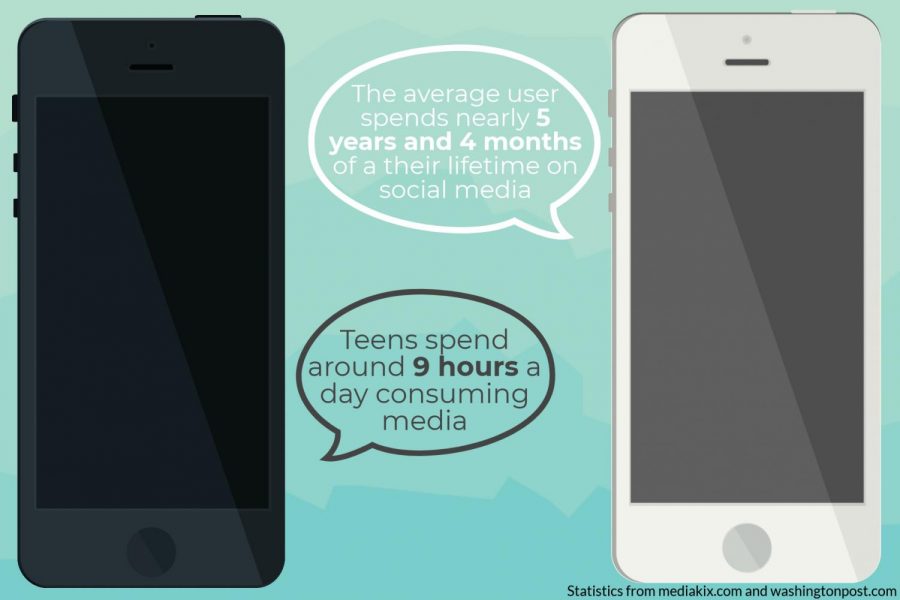Why I took a break from social media
Taking a break from social media improved my mental health, sleep and study habits.
April 7, 2019
On New Year’s Eve of sixth grade, I decided to put my new Instagram account to use: @xoxosoccerluver2002. With steady hands and dim lighting, I posted a pixelated photo of my giant Albert Einstein poster. The grain made his hair look like a palm tree fresh off of Florida’s finest beach. I didn’t care. It was my first post and I had two likes in an hour; I was practically famous. It was exhilarating, and I couldn’t get enough.
That feeling didn’t last very long. Eventually, I started isolating myself from others in real life under the pretense of being “connected” on social media. I constantly checked my notifications to keep up to date on other’s activities, the latest trends and accounts I could binge. I spent less and less time with my friends and family.
It was a never-ending cycle. The more I dived into Instagram, the more content I craved. The average user spends nearly 2 hours a day using social media, which amounts to 5 years and 4 months of a person’s lifetime. This destructive behavior mostly affects youth; teens spend around nine hours a day consuming media.
For me, social media was a distraction turned dangerous. I used it to procrastinate my homework, and it prevented me from getting a full night’s sleep. I started to have painful headaches—and later learned they were from too much screen exposure.
These platforms also affect mental health. Profiles often project the “perfect life,” showcasing everyone’s best moments and none of the worst. This social comparison, also called “Facebook Depression,” has been linked to lower self-esteem and depressive symptoms. It ties our self-worth to our apparent popularity. A study from UCLA found that receiving a high number of likes engages the “reward center” of the brain.
My own frustration with social media reached its peak during sophomore year. I was trying to study for a chemistry test, but like clockwork, I kept stopping to check my Instagram notifications. The action was ingrained in me, and I was shocked at my lack of self-control. On an impulse, I pressed down on the purple icon on the screen. It started buzzing with a small, gray X on the left corner. I pressed it. Delete Instagram? A text box popped up. Yes.
It’s now been around a year without Instagram, and my friends often ask me how I lasted so long. Although the beginning was hard—there were times I went on my Mom’s phone to see the world of Instagram through her eight loyal followers—deleting social media literally opened my eyes to the bigger picture. Instead of looking down at my phone and using social media as a distraction, I found new ways to start conversations after they lulled, to look outside of the window during boring bus rides and to focus on myself rather than others.
Most importantly, I was kinder to myself. Away from the rose-tinted perfection, I allowed myself more time to do things—like try different approaches to dreaded math proofs—and didn’t feel discouraged when I didn’t get it on the first try. The best part was laughing at myself again. During the peak of my social media use, my irritability was at an all-time high. I felt this crushing pressure to act and behave perfectly. But now—without social media weighing me down—I’m not as self-conscious about having flaws.
Although my fear of missing out (or FOMO) was tough, it was just as funny. My friends had to explain new trends and jokes to me, and their explanations combined with my clueless mindset made for stories that I still laugh about.
I’m not saying that I’ve sworn off social media forever. It has its benefits, from entertainment to keeping in touch with friends. I just needed a break to step back and see how absorbed I was, even when I strongly denied it.
In fact, a month ago, I re-downloaded Instagram. The first post I saw was a picture of artist Bob Ross with the caption #makeInstagramcasualagain. Although it could never compete with my iconic Albert Einstein photo, it did make me laugh really hard. It reminded me that Instagram is just a tool to show how we see the world; we have the control over what we post. So, we should post the candid, true moments as well as the “perfect” ones: the ones that make you cry, the ones that make you laugh and the ones that will make you think, “Wow, his hair really did look like a palm tree.”








